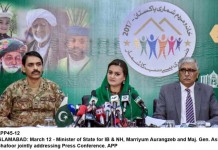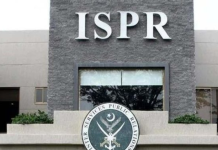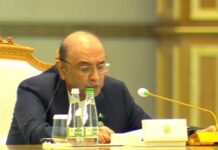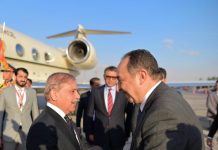ASTANA: The Organisation of Islamic Cooperation (OIC) member states have stressed the importance of taking swift action to put an immediate end to the ongoing brutal violence against the Rohingya Muslims in Myanmar.
On the sidelines of the first OIC summit on science and technology in Kazakhstan’s capital of Astana, the participants held an emergency meeting on the latest condition of the Rohingya Muslims amid the fresh wave of violence against the minority group.
A statement issued after the meeting condemned Myanmar for ‘systematic brutal acts’ against its Muslim Rohingya minority and asked it to accept international monitors. It urged Myanmar to accept UN monitors to carry out ‘a thorough and independent investigation of all established violations of international human rights and bring those responsible to justice’.
The statement also called for cooperation among Muslim countries aimed at dispatching humanitarian aid to the oppressed Rohingya and attending to the condition of the refugees.
The United Nations says nearly 300,000 Rohingya refugees have arrived in Bangladesh from the violence-wracked Rakhine state.
The current OIC chief is Turkish President Recep Tayyip Erdogan, who has been one of the loudest critics of Myanmar’s policies against the Rohingya.
The Rohingya are reviled in Myanmar, where the roughly one million-strong community are accused of being illegal immigrants from Bangladesh.
The plight of the Rohingya has triggered broad international condemnation of Myanmar and the country’s Nobel peace prize laureate leader Aung San Suu Kyi.
Addressing the summit on Sunday, Iran’s President Hassan Rouhani said immediate halt to violence against the Rohingya Muslims in Myanmar and addressing the problem of the refugees in the country should become a collective goal followed by all Islamic nations. “A major tragedy is underway in Myanmar,” President Rouhani later told his Turkish counterpart Recep Tayyip Erdogan. He stressed immediate resolution of the issue of the Muslim refugees who are fleeing Myanmar to find shelter in the neighboring countries.
Iran will soon dispatch humanitarian aid to the crisis-stricken Muslims in Myanmar, Rouhani said, adding that Iran, Turkey and all Islamic nations should put pressure on Myanmar government to stop violence against Muslims.
Myanmar’s government alleged last October that its posts had been attacked by Muslim militants, using the purported assault as a pretext for a siege on Rakhine state. It claimed that another attack had been carried out on August 25 this year, triggering the recent brutal crackdown on the civilians in that state. Since the beginning of the fresh wave of violence, counteroffensives by Myanmar’s army have killed hundreds of people, burned thousands of houses, razed a large number of villages and depopulated vast swathes of land in Rakhine state. There have been numerous reports of summary execution, rape, and other abuses against Myanmar’s Muslims since late last year.
However, Myanmar’s leader, Aung San Suu Kyi, has dismissed the Rohingya crisis as a misinformation campaign, rejecting the occurrence of any clampdown on the minority.
Also on Sunday, foreign minister of Bangladesh said genocide was being waged in Myanmar’s Rakhine state, triggering an exodus of nearly 300,000 Rohingya Muslims to his country. “The international community is saying it is a genocide. We also say it is a genocide,” AH Mahmood Ali was quoted by AFP as saying after briefing diplomats in Dhaka. Ali had a meeting with Western and Arab diplomats and the heads of UN agencies based in Bangladesh on Sunday to seek support for a political solution and discuss ways of delivering humanitarian aid to the Rohingya.
The Bangladeshi foreign minister told the diplomats that some 300,000 Rohingya Muslims had fled to his country in the past two weeks, increasing the total number of Rohingya refugees in Bangladesh to over 700,000.
“This is creating a huge challenge for Bangladesh in terms of providing shelter as well as other humanitarian assistance to them,” a Foreign Ministry statement said.
At least two diplomats who attended the briefings said the minister told them as many as 3,000 people may have been killed in the latest round of violence, AFP reported.
Published in Daily Times, September 11th 2017.














